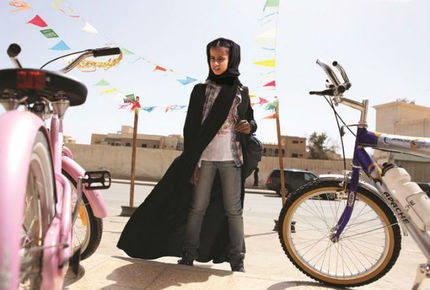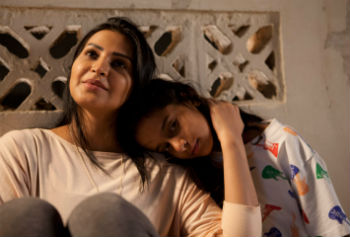Review: WADJDA, A Young Girl's Quest For A Bicycle Unveils Saudi Arabian Society

From Vittorio De Sica to Pee-wee Herman, bicycles have been a source of motivation and inspiration for film artists who want their characters to take a journey of discovery.
The latest example is the titular character in Haifa Al-Mansour's Wadjda, a willful Saudi girl, all of 10 years of age, who sets her sights on buying a bicycle so she can race her childhood friend Abdullah. No matter that bicycles are not 'toys for girls' in modern Saudi Arabia, according to everyone from Abdullah to the toy shop owner to Ms. Hussa, the stern principal of Wadjda's school, to Wadjda's own mother, a devout Muslim who believes that riding a bicycle will cause a woman to lose her virginity.
Wadjda marries a time-honored Hollywood storyline -- Wadjda (Waad Mohammed) decides to enter a contest to win the money to buy the bicycle, and learns unexpected lessons in the process -- with a Middle-Eastern perspective. From her toes to the top of her head, Wadjda is different than the other girls in her school: she wears old sneakers instead of the modest black shoes that are de rigeur; she resists covering her head; she likes to sing, even though "a woman's voice is her nakedness" and she is instructed to keep her voice down so that men do not hear it.
The most significant figures in her life are her mother (Reem Abdullah) and Ms. Hussa (Ahd). Wadjda's mother lives apart from her husband, for reasons that I was not able to glean, and works far away from home; she worries that her husband (Sultan Al Assaf) will take a second wife in about equal measure to how much she worries that Wadjda ignores her parental directives and does what she pleases.
Ms. Hussa runs the school with an iron fist, but she is not entirely without a heart; she is firm for what she believes and insists that all the girls follow the dictates of Islam and the law of the land. She is on the verge of suspending Wadjda for her rebellious behavior -- among other things, possessing tapes of illegal musical acts and making bracelets for football clubs, which are banned -- when Wadjda realizes that she can win the money she needs by 'reforming,' joining the religious club, and entering a school-run contest requiring a close study of the Koran.
 Haifa Al-Mansour, who wrote and directed, is the first female filmmaker in Saudi Arabia. She previously made three short films and the documentary Women Without Shadows. As her debut narrative feature, Wadjda is impressive beyond the circumstances of its production. (Reportedly, the director had to shoot exterior scenes from inside a van so as not to violate laws prohibiting women from working in public with men.)
Haifa Al-Mansour, who wrote and directed, is the first female filmmaker in Saudi Arabia. She previously made three short films and the documentary Women Without Shadows. As her debut narrative feature, Wadjda is impressive beyond the circumstances of its production. (Reportedly, the director had to shoot exterior scenes from inside a van so as not to violate laws prohibiting women from working in public with men.)
The film tells an easily-relatable, familiar story with simplicity and subtlety, never trumpeting its main themes nor over-dramatizing the turning points. The challenges for women in Saudi Arabia who want to follow their own path in life are definitely more difficult than in certain other lands, but, really, any country in which a patriarchal society holds sway -- which is everywhere -- poses unfair and often demeaning situations for women. The larger question is, How do you change and/or influence change that will make things equitable and fair for everyone?
In its modest manner, Wadjda calls attention to Saudi Arabia with refreshing acuity, and unfolds an engaging character study along the way.
The film screened extensively on the festival circuit; our own Kwenton Bellette saw it at the Melbourne International Film Festival and wrote about it earlier this year. WadjdaVisit the official site for more information.
Wadjda
Director(s)
- Haifaa Al-Mansour
Writer(s)
- Haifaa Al-Mansour
Cast
- Reem Abdullah
- Waad Mohammed
- Abdullrahman Al Gohani
- Ahd







